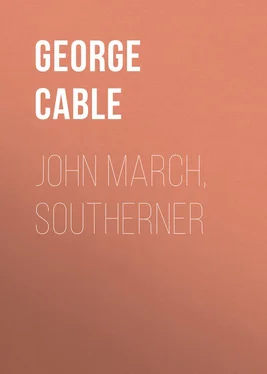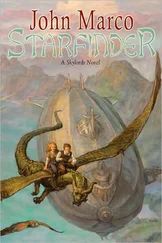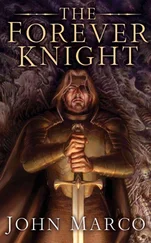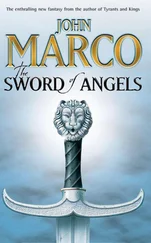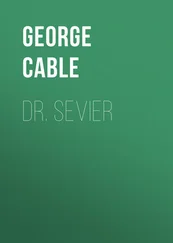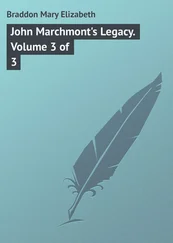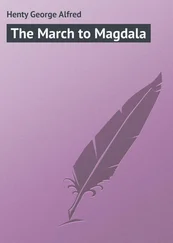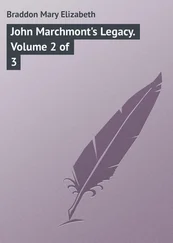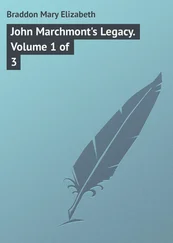George Cable - John March, Southerner
Здесь есть возможность читать онлайн «George Cable - John March, Southerner» — ознакомительный отрывок электронной книги совершенно бесплатно, а после прочтения отрывка купить полную версию. В некоторых случаях можно слушать аудио, скачать через торрент в формате fb2 и присутствует краткое содержание. Жанр: foreign_antique, foreign_prose, на английском языке. Описание произведения, (предисловие) а так же отзывы посетителей доступны на портале библиотеки ЛибКат.
- Название:John March, Southerner
- Автор:
- Жанр:
- Год:неизвестен
- ISBN:нет данных
- Рейтинг книги:3 / 5. Голосов: 1
-
Избранное:Добавить в избранное
- Отзывы:
-
Ваша оценка:
- 60
- 1
- 2
- 3
- 4
- 5
John March, Southerner: краткое содержание, описание и аннотация
Предлагаем к чтению аннотацию, описание, краткое содержание или предисловие (зависит от того, что написал сам автор книги «John March, Southerner»). Если вы не нашли необходимую информацию о книге — напишите в комментариях, мы постараемся отыскать её.
John March, Southerner — читать онлайн ознакомительный отрывок
Ниже представлен текст книги, разбитый по страницам. Система сохранения места последней прочитанной страницы, позволяет с удобством читать онлайн бесплатно книгу «John March, Southerner», без необходимости каждый раз заново искать на чём Вы остановились. Поставьте закладку, и сможете в любой момент перейти на страницу, на которой закончили чтение.
Интервал:
Закладка:
The senior presently resumed a narrative made timely by the two having just come through the town. "You must remember I inherited no means and didn't get my education without a long, hard fight. A thorough clerical education's no mean thing to get."
"Couldn't the church help you?"
"Oh – yes – I, ch – I did have church aid, but – Well, then I was three years a circuit rider and then I preached four years here in Suez. And then I married. Folks laugh about preachers always marrying fortunes – it was a mighty small fortune Rose Montgomery brought me! But she was Rose Montgomery, and I got her when no other man had the courage to ask for her. You know an ancestor of hers founded Suez. That's how it got its name. His name was Ezra and hers was Susan, don't you see?"
"I think I make it out," drawled the listener.
"But she didn't any more have a fortune than I did. She and her mother, who died about a year after, were living here in town just on the wages of three or four hired-out slaves, and – "
The younger voice interrupted with a question indolently drawn out: "Was she as beautiful in those days as they say?"
"Why, allowing for some natural exaggeration, yes."
"You built Rosemont about the time her mother died, didn't you?"
"Yes, about three years before the war broke out. It was the only piece of land she had left; too small for a plantation, but just the thing for a college."
"It is neatly named," pursued the questioner; "who did it?"
"I," half soliloquized the narrator, wrapped in the solitude of his own originality.
He moved into view, a large man of forty, unmilitary, despite his good gray broadcloth and wealth of gold braid, though of commanding and most comfortable mien. His upright coat-collar, too much agape, showed a clerical white cravat. His right arm was in a sling. He began to pick his way out of the brambles, dusting himself with a fine handkerchief. The horse came to meet him.
At the same time his young companion stepped upon a fallen tree, and stood to gaze, large-eyed, like the horse, across the sun-bathed scene. He seemed scant nineteen. His gray shirt was buttoned with locust thorns, his cotton-woolen jacket was caught under an old cartridge belt, his ragged trousers were thrust into bursted boots, and he was thickly powdered with white and yellow dust. His eyes swept slowly over the battle-ground to some low, wooded hills that rose beyond it against the pale northwestern sky.
"Major," said he.
The Major was busy lifting himself carefully into the saddle and checking his horse's eagerness to be off. But the youth still gazed, and said again, "Isn't that it?"
"What?"
"Rosemont."
"It is!" cried the officer, standing in his stirrups, and smiling fondly at a point where, some three miles away by the line of sight, a dark roof crowned by a white-railed lookout peeped over the tree-tops. "It's Rosemont – my own Rosemont! The view's been opened by cutting the woods off that hill this side of it. Come!"
Soon a wreath of turnpike dust near the broken culvert over Turkey Creek showed the good speed the travelers made. The ill-shod youth and delicately-shod horse trudged side by side through the furnace heat of sunshine. So intolerable were its rays that when an old reticule of fawn-skin with bright steel chains and mountings, well-known receptacle of the Major's private papers and stationery, dropped from its fastenings at the back of the saddle and the dismounted soldier stooped to pick it up, the horseman said: "Don't stop; let it go; it's empty. I burned everything in it the night of the surrender, even my wife's letters, don't you know?"
"Yes," said the youth, trying to open it, "I remember. Still, I'll take its parole before I turn it loose."
"That part doesn't open," said the rider, smiling, "it's only make-believe. Here, press in and draw down at the same time. There! nothing but my card that I pasted in the day I found the thing in some old papers I was looking over. I reckon it was my wife's grandmother's. Oh, yes, fasten it on again, though like as not I will give it away to Barb as soon as I get home. It's my way."
And the Reverend John Wesley Garnet, A.M., smiled at himself self-lovingly for being so unselfish about reticules.
"You need two thumbs to tie those leather strings, Jeff-Jack." Jeff-Jack had lost one, more than a year before, in a murderous onslaught where the Major and he had saved each other's lives, turn about, in almost the same moment. But the knot was tied, and they started on.
"Speakin' o' Barb, some of the darkies told her if she didn't stop chasing squir'ls up the campus trees and crying when they put shoes on her feet to take her to church, she'd be turned into a boy. What d' you reckon she said? She and Johanna – Johanna's her only playmate, you know – danced for joy; and Barb says, says she, 'An' den kin I doe in swimmin'?' Mind you, she's only five years old!" The Major's laugh came abundantly. "Mind you, she's only five!"
The plodding youth whiffed gayly at the heat, switched off his bad cotton hat, and glanced around upon the scars of war. He was about to speak lightly; but as he looked upon the red washouts in the forsaken fields, and the dried sloughs in and beside the highway, snaggy with broken fence-rails and their margins blackened by teamsters' night-fires, he fell to brooding on the impoverishment of eleven States, and on the hundreds of thousands of men and women sitting in the ashes of their desolated hopes and the lingering fear of unspeakable humiliations. Only that morning had these two comrades seen for the first time the proclamation of amnesty and pardon with which the president of the triumphant republic ushered into a second birth the States of "the conquered banner."
"Major," said the young man, lifting his head, "you must open Rosemont again."
"Oh, I don't know, Jeff-Jack. It's mighty dark for us all ahead." The Major sighed with the air of being himself a large part of the fallen Confederacy.
"Law, Major, we've got stuff enough left to make a country of yet!"
"If they'll let us, Jeff-Jack. If they'll only let us; but will they?"
"Why, yes. They've shown their hand."
"You mean in this proclamation?"
"Yes, sir. Major, 'we-uns' can take that trick."
The two friends, so apart in years, exchanged a confidential smile. "Can we?" asked the senior.
"Can't we?" The young soldier walked on for several steps before he added, musingly, and with a cynical smile, "I've got neither land, money, nor education, but I'll help you put Rosemont on her feet again – just to sort o' open the game."
The Major gathered himself, exaltedly. "Jeff-Jack, if you will, I'll pledge you, here, that Rosemont shall make your interest her watchword so long as her interests are mine." The patriot turned his eyes to show Jeff-Jack their moisture.
The young man's smile went down at the corners, satirically, as he said, "That's all right," and they trudged on through the white dust and heat, looking at something in front of them.
IV.
THE JUDGE'S SON MAKES TWO LIFE-TIME ACQUAINTANCES, AND IS OFFERED A THIRD
They had been ascending a long slope and were just reaching its crest when the Major exclaimed, under his voice, "Well, I'll be hanged!"
Before them stood three rusty mules attached to a half load of corn in the shuck, surmounted by a coop of panting chickens. The wheels of the wagon were heavy with the dried mud of the Sandstone County road. The object of the Major's contempt was a smallish mulatto, who was mounting to the saddle of the off-wheel mule. He had been mending the rotten harness, and did not see the two soldiers until he lifted again his long rein of cotton plough-line. The word to go died on his lips.
"Why, Judge March!" Major Garnet pressed forward to where, at the team's left, the owner of these chattels sat on his ill-conditioned horse.
Читать дальшеИнтервал:
Закладка:
Похожие книги на «John March, Southerner»
Представляем Вашему вниманию похожие книги на «John March, Southerner» списком для выбора. Мы отобрали схожую по названию и смыслу литературу в надежде предоставить читателям больше вариантов отыскать новые, интересные, ещё непрочитанные произведения.
Обсуждение, отзывы о книге «John March, Southerner» и просто собственные мнения читателей. Оставьте ваши комментарии, напишите, что Вы думаете о произведении, его смысле или главных героях. Укажите что конкретно понравилось, а что нет, и почему Вы так считаете.
